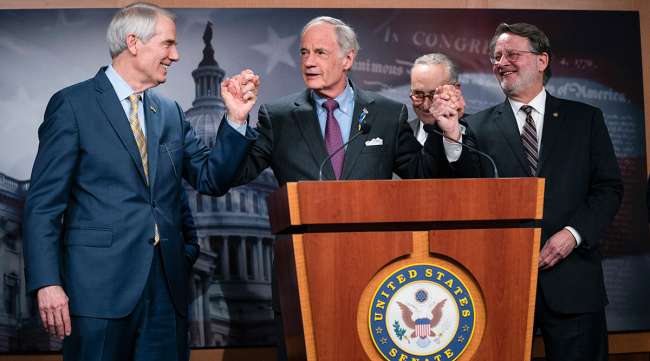Associated Press
Congress Passes Bill to Shore Up Postal Service

[Stay on top of transportation news: Get TTNews in your inbox.]
WASHINGTON — Congress on March 8 passed legislation that would shore up the U.S. Postal Service and ensure six-day-a-week mail delivery, sending the bill to President Joe Biden to sign into law.
The long-fought postal overhaul has been years in the making and comes amid widespread complaints about mail service slowdowns. Many Americans became dependent on the Postal Service during the COVID-19 crisis, but officials have repeatedly warned that without congressional action it would run out of cash by 2024.
“The post office usually delivers for us, but today we’re going to deliver for them,” said Senate Majority Leader Chuck Schumer (D-N.Y.)
With the Senate passage of the Postal Service Reform Act:
I want to thank the half-a-million postal workers who keep America going
When so many other services were shut down from COVID—USPS kept delivering goods, supplies, medicines
They’re public servants of the highest order — Chuck Schumer (@SenSchumer) March 9, 2022
Congress mustered rare bipartisan support for the Postal Service package, dropping some of the more controversial proposals to settle on core ways to save the service and ensure its future operations. Last month, the House approved the bill, 342-92, with all Democrats and most Republicans voting for it. On March 8, the Senate sent it to Biden’s desk on a 79-19 vote.
Republican Sen. Jerry Moran said the Postal Service has been in a “death spiral” that is particularly hard on rural Americans, including in his state of Kansas, as post offices shuttered and services were cut. “Smart reforms were needed,” he said.
The Postal Service Reform Act would lift unusual budget requirements that have contributed to the Postal Service’s red ink and would set in law the requirement that the mail is delivered six days a week, except in the case of federal holidays, natural disasters and a few other situations.
Postage sales and other services were supposed to sustain the Postal Service, but it has suffered 14 straight years of losses. Growing workers’ compensation and benefit costs, plus steady declines in mail volume, have contributed to the red ink, even as the Postal Service delivers to 1 million additional locations every year.
The bill would end a requirement that the Postal Service finance workers’ health care benefits ahead of time for the next 75 years, an obligation that private companies and federal agencies do not face.
Instead, the Postal Service would require future retirees to enroll in Medicare and would pay current retirees’ actual health care costs that aren’t covered by the federal health insurance program for older people.
Gone for now are ideas for cutting back on mail delivery, which had become politically toxic. Also set aside, for now, are other proposals that have been floated over the years to change postal operations, including those to privatize some services.
Sen. Gary Peters (D-Mich.), the chairman of the Homeland Security and Governmental Affairs Committee, helmed the legislation and said that since the nation’s founding, the Postal Service has become “a vital part of the fabric of our nation.”
In a 79-19 vote, the Senate passed the Postal Service Reform Act! “This is a monumental victory for letter carriers and all Americans who depend on the Postal Service for affordable and high-quality universal service,” NALC President Fredric Rolando said. https://t.co/X0N8Rb4hkD pic.twitter.com/ARGEmjGkAR — Letter Carriers (@NALC_National) March 8, 2022
Peters said the legislation would ensure the Postal Service can continue its nearly “250-year tradition of delivering service to the American people.”
Beyond cards and letters, people rely on the post office to deliver government checks, prescription drugs and many goods purchased online but ultimately delivered to doorsteps and mailboxes by the Postal Service.
“We need to save our Postal Service,” said Sen. Rob Portman (R-Ohio), another architect of the bill. Portman said the bill is not a bailout, and no new funding is going to the agency.
Criticism of the Postal Service peaked in 2020, ahead of the presidential election, as cutbacks delayed service at a time when millions of Americans were relying on mail-in ballots during the first year of the COVID-19 crisis.
At the time, President Donald Trump acknowledged he was trying to starve the Postal Service of money to make it harder to process an expected surge of mail-in ballots, which he worried could cost him the election.
Want more news? Listen to today's daily briefing above or go here for more info
Dominated by Trump appointees, the agency’s board of governors had tapped Louis DeJoy, a major GOP donor, as the new postmaster general. He proposed a 10-year plan to stabilize the service’s finances with steps like additional mail slowdowns, cutting some offices’ hours and perhaps higher rates.
To measure the Postal Service’s progress at improving its service, the bill also would require it to set up an online “dashboard” that would be searchable by ZIP code to show how long it takes to deliver letters and packages.
The legislation approved by Congress is supported by Biden, the Postal Service, postal worker unions and others.
Mark Dimondstein, the president of the American Postal Workers Union, called passage of the legislation a “turning point in the fight to protect and strengthen the people’s public postal service, a national treasure.”
Associated Press writer Alan Fram contributed to this report.




